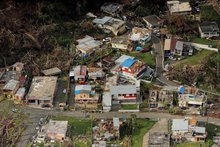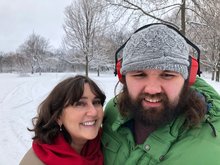0
Publication
Community:
Jan 18, 2019
The State of Arizona’s Medicaid agency (AHCCCS) recognizes the vital importance of safe, decent and affordable housing to health. With a portfolio of over 3,000 units of affordable housing for Medicaid members with a determination of serious mental illness (SMI) and/or substance use disorder, housing is a major component of how the State of Arizona assists those trying to recover and stabilize.
Authored by: Josh Crites for The Journal of Housing & Community Development
Topics: Health, Housing, Low-income, Medicaid / Medicare, Partnerships, Place-based
 Shared by Mica O'Brien
Shared by Mica O'Brien
Mica O'Brien posted a
on Feb 7, 2019
Josh Crites for The Journal of Housing & Community Development
The State of Arizona’s Medicaid agency (AHCCCS) recognizes the vital importance of safe, decent and affordable housing to health.
0
News Article
Community:
Feb 4, 2019
Central Ohio’s suburbs have become a target of affordable housing efforts. With the region’s rising housing costs straining people everywhere, developers, advocates and some city leaders are increasingly calling attention to the need for affordable housing to be built in places where it historically hasn’t been.
Authored by: Kevin Stankiewicz for The Columbus Dispatch
Topics: Community development, Housing, Midwest
 Shared by Mica O'Brien
Shared by Mica O'Brien
Mica O'Brien posted a
on Feb 7, 2019
Kevin Stankiewicz for The Columbus Dispatch
Central Ohio’s suburbs have become a target of affordable housing efforts.
0
News Article
Community:
Feb 4, 2019
Officials celebrated clearing the encampments, one of the top goals of the Philadelphia Resilience Project, the city’s emergency plan for Kensington. But, they said, it’s only the beginning of the larger effort to help people in addiction and heal a neighborhood ravaged by opioids.
Authored by: Joel Wolfram for WHYY
Topics: Homelessness, Housing, Legislation & Policy, Low-income, Substance abuse
 Shared by Mica O'Brien
Shared by Mica O'Brien
Mica O'Brien posted a
on Feb 7, 2019
Officials celebrated clearing the encampments, one of the top goals of the Philadelphia Resilience Project, the city’s emergency plan for Kensington. But, they said, it’s only the beginning of the larger effort to help people in addiction and heal a neighborhood ravaged by opioids.
0
Research
Community:
Feb 6, 2019
Research suggests that living in concentrated poverty is harmful to health, well-being, and economic mobility. Inclusionary zoning can break up poverty density by imposing legal requirements to create affordable housing across neighborhoods. In Montgomery County, Maryland, inclusionary zoning laws require developers to set aside 12 to 15 percent of new homes at below-market rates and allow the public housing authority to purchase a portion of these units. As a result, two-thirds of public housing residents in Montgomery County live in economically diverse, low-poverty neighborhoods. To assess the effects of these unique conditions, researchers explored how public housing residents’ social networks, neighborhood perceptions, and health outcomes differ based on their placement in mixed-income communities or traditionally clustered public housing.
Authored by: Heather Schwartz, Susan Burkhauser, Beth Ann Griffin, David Kennedy, Harold Green Jr., Alene Kennedy-Hendricks, and Craig Pollack for Housing Policy Debate, How Housing Matters
Topics: Community development, Housing, Mental health, Place-based, Research
 Shared by Housing Is
Shared by Housing Is
Housing Is posted a
on Feb 7, 2019
Heather Schwartz, Susan Burkhauser, Beth Ann Griffin, David Kennedy, Harold Green Jr., Alene Kennedy-Hendricks, and Craig Pollack for Housing Policy Debate, How Housing Matters
Research suggests that living in concentrated poverty is harmful to health, well-being, and economic mobility. Inclusionary zoning can break up poverty density by imposing legal requirements to create affordable housing across neighborhoods.
0
Publication
Community:
Feb 6, 2019
Decent, stable, and affordable rental housing has the power to improve lives, yet background checks and other systemic barriers reduce housing access and stability for a large part of the population—people who have been arrested or who are reentering communities after incarceration. The number of people who can be shut out of rental housing by criminal background checks and related policies calls for a national and local conversation about evidence-based ways to balance public safety and cohesion goals while supporting people with justice system histories in finding stable housing. Achieving this balance could interrupt cycles of inequity.
Authored by: Veronica Gaitan and Maya Brennan for How Housing Matters, Urban Institute
Topics: Criminal justice, Homelessness, Housing
 Shared by Housing Is
Shared by Housing Is
Housing Is posted a
on Feb 7, 2019
Veronica Gaitan and Maya Brennan for How Housing Matters, Urban Institute
Decent, stable, and affordable rental housing has the power to improve lives, yet background checks and other systemic barriers reduce housing access and stability for a large part of the population—people who have been arrested or who are reentering communities after incarceration.
0
Webinar
Community:
Jul 17, 2018
Featuring Ellen Childs, PhD, from Boston University School of Public Health and Vaughan Rees, PhD, from Harvard T.H. Chan School of Public Health.
Authored by: Building Success
Topics: Health, Housing, Legislation & Policy, Smoke-free
 Shared by Housing Is
Shared by Housing Is
Housing Is posted a
on Feb 4, 2019
Featuring Ellen Childs, PhD, from Boston University School of Public Health and Vaughan Rees, PhD, from Harvard T.H. Chan School of Public Health.
0
Publication
Community:
Build success with effective enforcement. Someone who smokes where smoking is prohibited is violating the policy. Enforcement of the smoke-free policy is similar to enforcement of other building policies, like noise or pet restrictions. Be consistent, fair, positive, and pragmatic.
Authored by: Building Success
Topics: Health, Housing, Legislation & Policy, Smoke-free
 Shared by Housing Is
Shared by Housing Is
Housing Is posted a
on Feb 4, 2019
Build success with effective enforcement. Someone who smokes where smoking is prohibited is violating the policy. Enforcement of the smoke-free policy is similar to enforcement of other building policies, like noise or pet restrictions. Be consistent, fair, positive, and pragmatic.
0
Publication
Community:
Build success by helping smokers comply with the policy. Some residents who smoke may not be ready or able to stop smoking, but you can work with them to help them comply with the policy. Showing compassion to residents facing barriers to compliance may increase acceptance of the policy and willingness to comply.
Authored by: Building Success
Topics: Health, Housing, Legislation & Policy, Smoke-free
 Shared by Housing Is
Shared by Housing Is
Housing Is posted a
on Feb 4, 2019
Build success by helping smokers comply with the policy. Some residents who smoke may not be ready or able to stop smoking, but you can work with them to help them comply with the policy.
0
Publication
Community:
Build success by supporting cessation among smokers for whom a smoke-free housing policy may provide motivation to quit.
Authored by: Building Success
Topics: Health, Housing, Legislation & Policy, Smoke-free
 Shared by Housing Is
Shared by Housing Is
Housing Is posted a
on Feb 4, 2019
Build success by supporting cessation among smokers for whom a smoke-free housing policy may provide motivation to quit.
0
Publication
Community:
Build success by partnering with local agencies and organizations. Community partners can advise during planning, education residents during implementation, and help support cessation.
Authored by: Building Success
Topics: Health, Housing, Legislation & Policy, Partnerships, Smoke-free
 Shared by Housing Is
Shared by Housing Is
Housing Is posted a
on Feb 4, 2019
Build success by partnering with local agencies and organizations. Community partners can advise during planning, education residents during implementation, and help support cessation.
0
Publication
Community:
Build success by training staff on how to effectively share information about the policy and the importance of consistent enforcement.
Authored by: Building Success
Topics: Health, Housing, Legislation & Policy, Smoke-free
 Shared by Housing Is
Shared by Housing Is
Housing Is posted a
on Feb 4, 2019
Build success by training staff on how to effectively share information about the policy and the importance of consistent enforcement.
0
Publication
Community:
Build Success by engaging residents. Residents can be a strong asset in planning, communication, implementation, and compliance efforts.
Authored by: Building Success
Topics: Health, Housing, Legislation & Policy, Place-based, Smoke-free
 Shared by Housing Is
Shared by Housing Is
Housing Is posted a
on Feb 4, 2019
Build Success by engaging residents. Residents can be a strong asset in planning, communication, implementation, and compliance efforts.
0
Publication
Community:
Developing effective smoke-free policies requires clear language about why the policy is being adopted, where smoking is and isn't allowed, who is responsible for reporting and investigating violations, and how the policy will be enforced.
Authored by: Building Success
Topics: Housing, Legislation & Policy, Place-based, Smoke-free
 Shared by Housing Is
Shared by Housing Is
Housing Is posted a
on Feb 4, 2019
Developing effective smoke-free policies requires clear language about why the policy is being adopted, where smoking is and isn't allowed, who is responsible for reporting and investigating violations, and how the policy will be enforced.
0
Policy Brief
Community:
More than one-third of adult public housing residents in the US smoke—totaling approximately 400,000 smokers, putting other residents and staff at risk of negative health effects.
Authored by: Building Success
Topics: Asthma, Health, Housing, Legislation & Policy, Place-based, Smoke-free
 Shared by Housing Is
Shared by Housing Is
Housing Is posted a
on Feb 4, 2019
More than one-third of adult public housing residents in the US smoke—totaling approximately 400,000 smokers, putting other residents and staff at risk of negative health effects.
0
News Article
Community:
Feb 4, 2019
The U.S. territory needs to urgently tackle issues such as "widespread informal housing" and "the exorbitant amount of abandoned spaces" as it rebuilds after Hurricane Maria.
Authored by: Nicole Acevedo for NBC News
Topics: Community development, Food insecurity, Funding, Homelessness, Housing, Legislation & Policy, Nutrition, Safety, Stability, U.S. Territories
 Shared by Housing Is
Shared by Housing Is
Housing Is posted a
on Feb 4, 2019
Nicole Acevedo for NBC News
The U.S. territory needs to urgently tackle issues such as "widespread informal housing" and "the exorbitant amount of abandoned spaces" as it rebuilds after Hurricane Maria.
0
Interactive
Community:
The map focuses on four critical areas of policy: protections against source-of-income discrimination, the regulation of short-term rentals, inclusionary housing programs, and rent control. The rising tide of state preemption detailed in this tool makes it clear that local initiatives and innovation are being blocked when the need for affordable housing and creativity in advancing inclusion is most needed.
Authored by: Poverty and Race Research Action Council
Topics: Housing, Legislation & Policy, Low-income, Racial inequalities, Research
 Shared by Mica O'Brien
Shared by Mica O'Brien
Mica O'Brien posted a
on Jan 31, 2019
Poverty and Race Research Action Council
The map focuses on four critical areas of policy: protections against source-of-income discrimination, the regulation of short-term rentals, inclusionary housing programs, and rent control.
0
News Article
Community:
Jan 25, 2019
A long understudied facet of the American housing market, evictions have hit no area of the country harder than the South, a region home to most of the top-evicting large and mid-sized U.S. cities, according to a list released by Princeton’s Eviction Lab.
Authored by: Max Blau for The Telegraph
Topics: Homelessness, Housing, Research, South, Stability
 Shared by Mica O'Brien
Shared by Mica O'Brien
Mica O'Brien posted a
on Jan 31, 2019
Max Blau for The Telegraph
A long understudied facet of the American housing market, evictions have hit no area of the country harder than the South, a region home to most of the top-evicting large and mid-sized U.S. cities, according to a list released by Princeton’s Eviction Lab.
0
News Article
Community:
Jan 29, 2019
Housing complex would integrate residents with special needs into the larger community
Authored by: Tara Bahrampour for The Washington Post
Topics: Disabilities, Dual-generation, Housing, Mental health, Place-based, Safety
 Shared by Housing Is
Shared by Housing Is
Housing Is posted a
on Jan 31, 2019
Tara Bahrampour for The Washington Post
Housing complex would integrate residents with special needs into the larger community
0
Publication
Community:
Evidence shows that retrofitting the entire stock of multifamily apartment buildings in the United States could save tenants and property owners $8 billion a year in energy costs and reduce electricity consumption by almost 15 percent. Amid the rising cost of housing, energy efficiency upgrades can provide much-needed relief to low-income families and help keep rental stock affordable, but few documented examples showcase the benefits of energy retrofits in multifamily housing. Addressing this gap, this study measures the impact of a collaborative energy efficiency program in Orlando, Florida, analyzing energy costs before and after retrofits in four multifamily apartment complexes.
Authored by: Nicholas Taylor, Jennison Searcy, and Pierce Jones for Energy Efficiency
Topics: Energy, Housing, Low-income, Research, Sustainability
 Shared by Housing Is
Shared by Housing Is
Housing Is posted a
on Jan 31, 2019
Nicholas Taylor, Jennison Searcy, and Pierce Jones for Energy Efficiency
Evidence shows that retrofitting the entire stock of multifamily apartment buildings in the United States could save tenants and property owners $8 billion a year in energy costs and reduce electricity consumption by almost 15 percent.
0
News Article
Community:
Jan 30, 2019
More than 130,000 households in Los Angeles County receive some form of federal rental assistance and were at risk of not being able to pay their rent if the shutdown had lasted through the end of February. But the mere threat of thousands of poor people returning to homelessness in L.A. — and the possibility of that threat happening again — has rattled government officials and affordable housing advocates.
Authored by: Benjamin Oreskes and Doug Smith for The Los Angeles Times
Topics: CLPHA, Funding, Homelessness, Housing, Legislation & Policy, Stability, West Coast
 Shared by Housing Is
Shared by Housing Is
Housing Is posted a
on Jan 30, 2019
Benjamin Oreskes and Doug Smith for The Los Angeles Times
More than 130,000 households in Los Angeles County receive some form of federal rental assistance and were at risk of not being able to pay their rent if the shutdown had lasted through the end of February. But the mere threat of thousands of poor people returning to homelessness in L.A.
1
News Article
Community:
Jan 30, 2019
Housing subsidies are one of the fastest ways to get a homeless person off the street or to prevent someone from becoming homeless in the first place. Federal subsidies — dispensed through Section 8 vouchers and other forms of aid for renters — use public dollars to make up the difference between what a person can afford to pay for an apartment and what landlords typically charge for one. They’re an essential tool to help Los Angeles end its homeless crisis. But there is a problem: A growing number of landlords won’t even considering leasing to tenants with vouchers or other forms of government rental assistance.
Authored by: Editorial Board for The Los Angeles Times
Topics: Homelessness, Housing, Legislation & Policy, Low-income, Mobility, West Coast
 Shared by Housing Is
Shared by Housing Is
Housing Is posted a
on Jan 30, 2019
Editorial Board for The Los Angeles Times
Housing subsidies are one of the fastest ways to get a homeless person off the street or to prevent someone from becoming homeless in the first place.
0
Policy Brief
Community:
Jan 30, 2019
NLIHC stands ready to work with all members of Congress to seize the opportunity to address the full scope of affordable housing challenges for families with the greatest needs. In the memorandum below, we provide our recommendations on steps Congress can take—whether through an infrastructure spending package, the appropriations process, housing finance reform, or other legislative avenues—to make the critical investments in the affordable housing our nation needs to help the economy, our communities, children and families thrive.
Authored by: National Low Income Housing Coalition
Topics: Child welfare, Community development, Criminal justice, Funding, Homelessness, Housing, Legislation & Policy, Low-income, Mobility, Racial inequalities, Safety
 Shared by Housing Is
Shared by Housing Is
Housing Is posted a
on Jan 30, 2019
National Low Income Housing Coalition
NLIHC stands ready to work with all members of Congress to seize the opportunity to address the full scope of affordable housing challenges for families with the greatest needs.
0
Research
Community:
Mar 14, 2017
This brief examines the well-being of young children 20 months after staying in emergency homeless shelters with their families.
Authored by: Office of the Administration for Children & Families, U.S. Department of Health and Human Services
Topics: Early childhood, Homelessness, Housing, Literacy, Low-income, Research, School-readiness
 Shared by Mica O'Brien
Shared by Mica O'Brien
Mica O'Brien posted a
on Jan 29, 2019
Office of the Administration for Children & Families, U.S. Department of Health and Human Services
This brief examines the well-being of young children 20 months after staying in emergency homeless shelters with their families.
1
News Article
Community:
Jun 11, 2018
At a recent public meeting, Sandra Lee Fewer, a member of the city’s Board of Supervisors, asked acting librarian Michael Lambert to explore whether future library renovations might include affordable housing. Fewer hopes to leverage existing public land to create multi-story facilities that include both libraries and housing.
Authored by: Steve Dubb for NPQ
Topics: Community development, Homelessness, Housing, Literacy, Low-income, Partnerships, Place-based, Research, Youth
 Shared by Housing Is
Shared by Housing Is
Housing Is posted a
on Jan 29, 2019
At a recent public meeting, Sandra Lee Fewer, a member of the city’s Board of Supervisors, asked acting librarian Michael Lambert to explore whether future library renovations might include affordable housing.
0
News Article
Community:
Jan 24, 2019
A new collaboration of San Francisco Bay Area foundations and businesses is raising $540 million to tackle the region’s affordable housing crisis.
Authored by: Affordable Housing Finance
Topics: Community development, Health, Housing, Low-income, Partnerships, Supportive housing, West Coast
 Shared by Housing Is
Shared by Housing Is
Housing Is posted a
on Jan 28, 2019
Affordable Housing Finance
A new collaboration of San Francisco Bay Area foundations and businesses is raising $540 million to tackle the region’s affordable housing crisis.


 Shared by Housing Is
on Feb 7, 2019
Shared by Housing Is
on Feb 7, 2019
 Shared by Housing Is
on Feb 7, 2019
Shared by Housing Is
on Feb 7, 2019
 Shared by Housing Is
on Feb 4, 2019
Shared by Housing Is
on Feb 4, 2019
 Shared by Housing Is
on Feb 4, 2019
Shared by Housing Is
on Feb 4, 2019
 Shared by Housing Is
on Feb 4, 2019
Shared by Housing Is
on Feb 4, 2019
 Shared by Housing Is
on Feb 4, 2019
Shared by Housing Is
on Feb 4, 2019
 Shared by Housing Is
on Feb 4, 2019
Shared by Housing Is
on Feb 4, 2019
 Shared by Housing Is
on Feb 4, 2019
Shared by Housing Is
on Feb 4, 2019
 Shared by Housing Is
on Feb 4, 2019
Shared by Housing Is
on Feb 4, 2019
 Shared by Housing Is
on Feb 4, 2019
Shared by Housing Is
on Feb 4, 2019
 Shared by Housing Is
on Feb 4, 2019
Shared by Housing Is
on Feb 4, 2019

 Shared by Housing Is
on Feb 4, 2019
Shared by Housing Is
on Feb 4, 2019




 Shared by Housing Is
on Jan 31, 2019
Shared by Housing Is
on Jan 31, 2019

 Shared by Housing Is
on Jan 31, 2019
Shared by Housing Is
on Jan 31, 2019

 Shared by Housing Is
on Jan 30, 2019
Shared by Housing Is
on Jan 30, 2019


 Shared by Housing Is
on Jan 30, 2019
Shared by Housing Is
on Jan 30, 2019

 Shared by Housing Is
on Jan 30, 2019
Shared by Housing Is
on Jan 30, 2019

 Shared by Housing Is
on Jan 29, 2019
Shared by Housing Is
on Jan 29, 2019

 Shared by Housing Is
on Jan 28, 2019
Shared by Housing Is
on Jan 28, 2019



